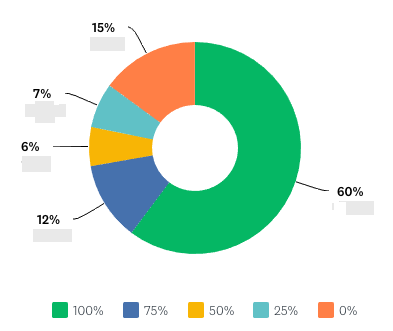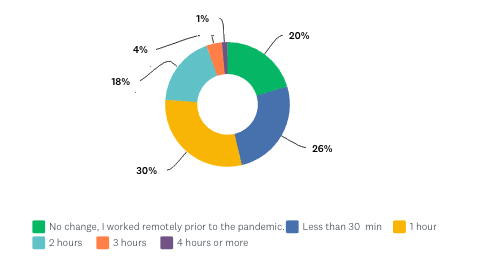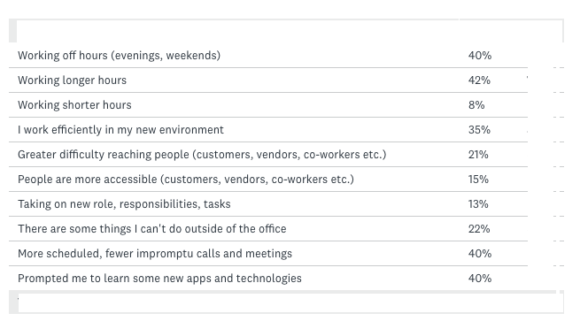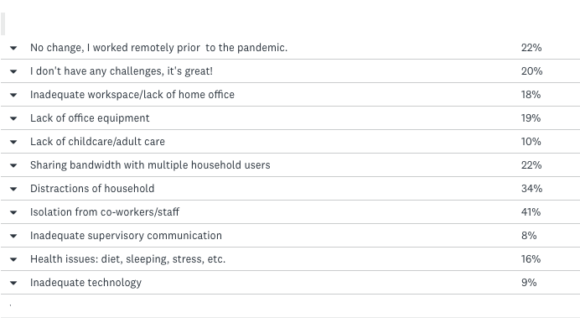
According to Dorothy in the Wizard of Oz, there’s no place like home.
For many in the property/casualty insurance industry, home is where their job has been during the pandemic.
While millions of people in other industries have been laid off and furloughed since anti-contagion policies and business shutdowns began in March, most property/casualty insurance professionals have been able to keep working. Many had the option to work remotely, an option not available to those working for restaurants, hotels, meat processing plants or fitness clubs.
During the coronavirus outbreak, 78% of employees in the industry say they have worked from home 50% or more of the time, according to results from Wells Media Group’s Property/Casualty Insurance Industry Coronavirus Survey. A majority 60% of all respondents have worked from home 100% of the time. Another 12% have been working from home 75% of the time and 6% said they have worked remotely 50% of the time.
While industrywide 60% have been working at home full-time during the pandemic, a higher percentage affiliated with carriers (70%) than from agencies and brokerages (51%) worked from home full-time.
What percentage of time have you spent working from home?

While many enjoy the work-from-home experience, others — especially parents with children at home— struggle with it, the survey found.
The 2020 Property/Casualty Insurance Industry Coronavirus Survey captured responses from 1,704 individuals representing a cross section of the industry: 54% work in agencies and brokerages; 31% work for insurers or reinsurers; 10% are vendors (technology, claims, legal, etc.) to the industry; and 5% work in other insurance-related organizations.
For 22% of the industry workforce surveyed, the transition to remote working was a non-event as they were doing it before the pandemic hit. About 18% of agency and brokerage respondents worked from home prior to the coronavirus outbreak.
There is some regional variation in the working from home experience. A higher percentage of associates in East states (66%) have been working from home full time during the outbreak, while in Texas/South Central region only 50% have been. The Southeast (28%) and West (25%) had the highest percentages who worked from home before the outbreak.
What It’s Been Like
Industrywide, 35% of respondents believe that they work efficiently at home; a slightly smaller percentage — 31% — with agencies and brokerages said they feel they work efficiently from home.
While 22% industrywide said there are some parts of their jobs they can’t do remotely, a higher share — 27%— of associates in agencies and brokerages said this is the case.
Travel routines are not what they used to be.
Business travel to clients and conferences came to a standstill during the pandemic. More than two-thirds (70%) lost some business travel: 39% lost 1 to 5 trips, while 31% lost 6 or more including 7% who lost more than 20.
A major change has been not having to commute to work. Almost one-third (30%) of respondents say they save an hour and 18% save two hours a day.
About how much time have you saved a day not commuting to an office?

“Obtaining time back from not having to commute has given me extra time to spend on myself (wellness, fitness, time with family). I feel healthier and stress free. I am also more efficient at home and the quality of my servicing has improved greatly. The office can be nice to see coworkers but honestly it also provides a platform for a LOT of distractions. I don’t have those distractions anymore so I am able to focus and work very efficiently,” commented one participant.
Survey respondents identified some of the good and bad effects on their work of working remotely.
For 42%, working from home has meant working longer hours, while for 40% it has meant working off-hours. Only 8% said they have worked fewer hours than when in the office.
Forty percent (40%) say they were prompted to learn a new technology or app, while 13% took on new roles and responsibilities.
Communication has been different during the pandemic, of course. For many (40%), working from home has meant having more scheduled calls and meetings and fewer impromptu ones. For 21%, it has been more difficult reaching clients and customers.
How has your remote work environment impacted your role and work habits?

Challenges at Home
The biggest challenge of working from home, cited by 41%, is the isolation from co-workers. Distractions of the household is the next biggest challenge, cited by 34%.
Other challenges include inadequate workspace (19%) and lack of office equipment (19%). Inadequate technology is a problem for only 9%; 22% cite sharing bandwith with others as a challenge.
Share the challenges you face in your remote work environment.

What’s Not to Like?
The experience of working from home during the pandemic has been a mixed bag for property/casualty insurance professionals, according to responses to the survey questions and more than 1,300 individual comments. While many respondents love it, others are less enthusiastic. The less enthusiastic people tend to be those who face dual responsibilities of taking care of work while also taking care of children at home. This has not been easy.
“Working at home and homeschooling has been a very difficult juggling act. It has meant that I tend to work longer hours than before,” said one respondent.
“I’m a mother of 3 kids ages 5, 8, and 10. Before I would work when my kids were in school. Now that I am with them 24/7 and also homeschooling, I have not been able to focus on my insurance business at all,” wrote a woman in the industry. “I check my emails in the morning and evening when the kids are still asleep. Right now I’m doing the bare minimum for insurance. And it makes me nervous that as things are opening up, I myself cannot meet that demand if public schools are not normal. I feel like I always have to justify why I can’t work, and it’s because I’m watching 3 kids with literally no break.”
“Working insurance claims with two children in the home, 5 and 7 years old, needing constant attention and assistance, while attorneys and customers are calling me,” was the most difficult part for another.
“Working full time with a spouse 1st responder out of the house 12+ hrs each day and home schooling 3 children,” was how another described the difficulty.
Only Way to Go
On the positive side, many working in the industry are sold on the merits of remote work.
For 22% of respondents, “it’s great” and they have faced no challenges at all working from home.
One participant believes remote work is the only way to go. “Working in an office is unnecessary. Only companies who don’t trust their employees demand employees be in the office. You are working for the wrong company if they don’t trust you or the company has the wrong employees if the employees can’t be trusted to work remotely,” this person wrote.
“It makes me think I can do it 100% from home all the time,” wrote another enthusiast of his stay-at-home test.
“I can be more efficient with my time when no one is around to interrupt projects,” a third fan commented.
“I realize I can do my job remotely with little problem and remain in contact with my team as if we were in the office together,” acknowledged a manager.
For others, working from home isn’t what they prefer but they are doing it.
“I am 68 years old and much prefer working from office as I have for so many years. I feel like I have adapted well nonetheless,” commented one professional.
For another with remote experience, this period has been especially taxing. “I’ve been a remote employee for 2.5+ years and I’m more exhausted from the last two months than I’ve ever been before,” the employee wrote. “It’s been incredibly stressful and scary both to be concerned for physical wellbeing but also worried for mental and socioeconomic stability.”
For a good number of those surveyed, the overall experience is making them think more about their retirement.
“I am glad I have an essential job that allows me to work from home. I am fortunate that if I do not feel safe at the office and the office re-opens, I am at a stage in my life that I can choose to retire early and not return to the office if my employer will not permit me to continue to work from home,” commented one person.
Another is unhappy and was blunt about it: “I want to retire as soon as I can.”
Back to Work
If they have to go back to work in an office, 51% industrywide said they would be ready to do so within a month. For others it could be a bit longer before they are comfortable going back: 21% say 3 months; 14% say six months; 4% say 9 months and 9% say a year or longer.
A higher percentage (61%) of agency and brokerage respondents say they would go back to an office within a month, while 17% in agencies want to wait three months, 12% six months, 2% 9 months and 7% of agency and brokerage workers prefer to wait a year or more.
Some of them may not have to decide. Thirty-five percent (35%) say they think their employer intends to keep remote work in place for the foreseeable future and another 42% think it is a possibility their employer will do so. Only 23% say they do not expect their employer to require remote work going forward.
Source: Property/Casualty Insurance Industry Coronavirus Survey
Next: When Will P/C Insurance Professionals Be Getting Back to Normal?
Was this article valuable?
Here are more articles you may enjoy.



 Insurance Broker Stocks Sink as AI App Sparks Disruption Fears
Insurance Broker Stocks Sink as AI App Sparks Disruption Fears  Preparing for an AI Native Future
Preparing for an AI Native Future  Florida Engineers: Winds Under 110 mph Simply Do Not Damage Concrete Tiles
Florida Engineers: Winds Under 110 mph Simply Do Not Damage Concrete Tiles  World’s Growing Civil Unrest Has an Insurance Sting
World’s Growing Civil Unrest Has an Insurance Sting 

